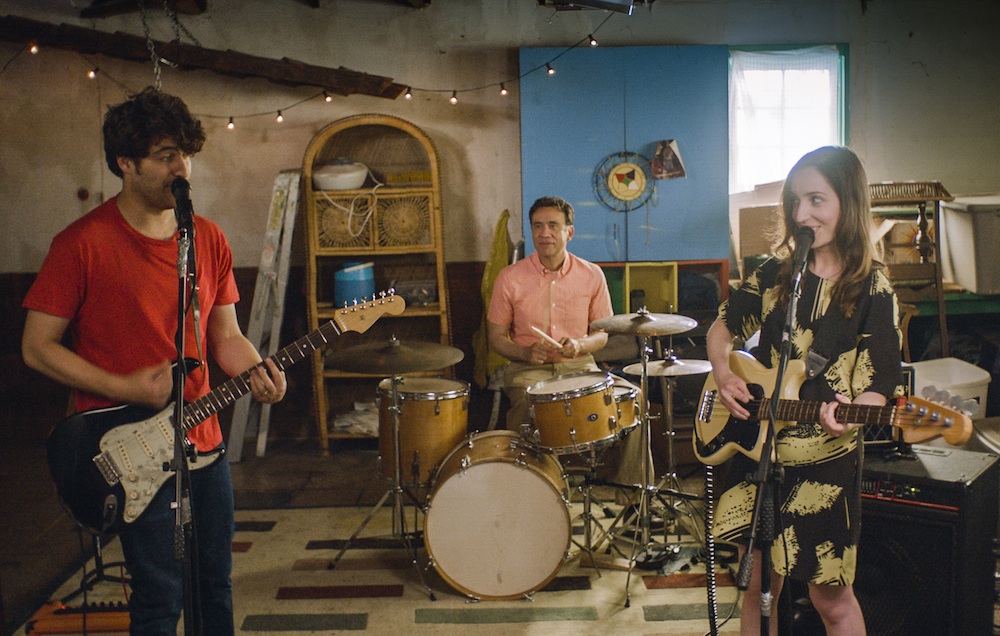Zoe Lister-Jones Starts a Band

ADAM PALLY, FRED ARMISEN, AND ZOE LISTER-JONES IN BAND AID. PHOTO COURTESY OF IFC FILMS.
In Band Aid, the directorial debut from writer, producer, and actor Zoe Lister-Jones, a married couple turns to music for catharsis. Both in their thirties, Anna (Lister-Jones) and Ben (Adam Pally) are not where they hoped they’d be personally or professionally. Anna works as an Uber driver; Ben designs corporate logos. While most of their friends have young children, Anna and Ben are struggling to come to terms with a recent miscarriage. Using their stalemate arguments as fodder for songs, the two decide to start a band with their recovered sex addict neighbor (Fred Armisen). “I love you, but I don’t want to fuck you, fuck you, fuck you,” Anna and Ben sing in unison. “I don’t want to fuck you.”
“I’ve always been interested in the inner workings of long-term relationships and why couples who stay together choose to do so. I hadn’t really seen that portrayed in all of its authenticity on screen,” explains Lister-Jones. “I chose to write a story that could delve into the banalities of commitment and marital strife through music.”
Raised in New York City, Lister-Jones studied acting at NYU. In addition to her work as an actor in television series Life in Pieces and New Girl, Lister-Jones has written and produced several features with her now-husband Daryl Wein, including Breaking Upwards (2009) and Consumed (2015).
EMMA BROWN: I loved your movie Breaking Upwards, which is also about a long-term relationship and the question of whether it’s worth staying together. Do you feel like your perspective on relationships has changed significantly in the years since Breaking Upwards?
ZOE LISTER-LISTER-JONES: Breaking Upwards came out in 2010, but we wrote it in 2008, so it’s been almost 10 years. I had only been with my now-husband for three years when we made that movie, and now we’ve been together for almost 13. My take on commitment and love and the work that it takes to maintain both of those things is ever evolving. This film is very much where I was at, at this stage in my life.
BROWN: When did you start writing songs? Did you grow up playing instruments?
LISTER-JONES: I started writing poetry when I was about 11, but I started to write lyrics in college. With Breaking Upwards, I wrote all the lyrics to our original score and sang on a few songs. I had been collaborating with my friend Kyle Forester, who I collaborated with on the melodies for this movie, for many years. I actually never played an instrument; I learned bass for Band Aid, which really was fun. I was in a band in high school and college called Maxi Geil. I was a backup singer, so that’s where I started learning my own voice as a singer. But putting it all together with writing the lyrics, working on music, and learning the bass, it was a new and exciting challenge.
BROWN: There’s a line in Band Aid about how no one “chooses” to play the bass, they just end up playing bass. What made you choose the bass?
LISTER-JONES: I always found primo bass players very sexy and I also really love bass-forward songs—whenever there’s a song that really features a bass line, I am really into it.
BROWN: Which song did you write first? Did you get writer’s block at all?
LISTER-JONES: I think the first one I wrote was “I Don’t Want to Fuck You.” That one came pretty easily. The rest of the songs I wrote as the story unfolded as part of the screenwriting process. The song that probably took me the longest was the song that my character sings as a solo in the third act. It didn’t take me a long time to write, but it took some emotional unpacking for me to get there.
BROWN: Do you find that, even when your work as a filmmaker is fictional, people often assume it is autobiographical? Does that bother you at all?
LISTER-JONES: I understand the inclination to think that something is autobiographical; as artists, I think it is impossible to not draw upon personal experience, but there are always a lot of fictional elements that come into play. This film is just that, it’s a mixed bag. It’s a tricky thing when you put yourself out there as an artist; it’s quite vulnerable. In some ways, you do welcome those questions because it’s part and parcel with the profits of sharing one’s work. But sometimes it does veer into territory that’s a little too personally probing.
BROWN: I heard that you met Adam Pally at a party. Is that true?
LISTER-JONES: We met at a party, super briefly, three years ago, but the first time I really spoke to him was two years ago at an Emmy party. We were in a circle of friends—we have a lot of mutual friends. I don’t really drink alcohol, and I mentioned it in passing: “I’m just drinking water.” Then we all dispersed, and Adam walked past me and brought me a water. We spent the next half an hour talking and having a good time. We share a lot of similar sensibilities in terms of our humor and our vibe. I think that was the night that I was like, “That might be the dude for my movie.”
BROWN: Did you write role of Dave with Fred Armisen in mind? It seems like such a perfect fit, especially since Fred is a drummer in real life.
LISTER-JONES: I didn’t write the role with him in mind, but I don’t know who else could have played it. There are so few actors that are not only as brilliant as Fred comedically, but who can also go to darker places. Then to be that musically proficient and amazing, it’s such a rarity. I really lucked out. I asked him multiple times. I just hounded him until he said yes. [laughs]
BROWN: This is your directorial debut. Had you always planned to start directing, or was it something you developed interest in over the course of your career?
LISTER-JONES: As a writer, producer, actor, it was kind of a boot camp that lead up to this moment. I don’t know that I ever crystalized that as an ambition as I was making those films—”I should be directing”—it was more, “When the time is right, this is something that I’ll do.” It was never something that I was chomping at the bit to do; I was waiting for the right moment in my life and career when it felt like something that I really had to do.
BROWN: What made Band Aid the right moment—was it the specifics of the film or just timing?
LISTER-JONES: It was a little bit of both. This is the first film that I’ve written without my husband, and it felt much more wholly mine. I also knew that there were creative choices that I felt very strongly about that would come much more easily in the process if I was directing the film. There were producorial choices as well, like hiring an all female crew, that I felt would be much more easily implemented. And in my life it felt like I was ready for a new challenge and something that scared me, and directing did scare me.
BROWN: With the all female crew, was that something that you had always planned to do when you were in a position to do so? Or have you been thinking about it more in recent years?
LISTER-JONES: It’s something that I’ve thought about for my whole life, just by nature of being raised by a feminist and viewing the world with a lens that was honed in on gender inequities. I don’t think it was like, “When I have the chance, I’m going to hire an all female crew!” It all happened very organically. More than anything, I wanted to see what it would feel like as a woman and as an artist to create work in that environment. It was markedly different. It totally exceeded my expectations. It was a really nurturing, calm, patient, and efficient energy, and I think it impacted the film itself in addition to the filmmaking. I just directed our first music video for the Dirty Dishes, which is the band in the movie, and I hired an all female crew for that and it was equally as exciting and wonderful. It’s something that I personally find creatively fulfilling and effective. The energy on set shifts because every crewmember feels the weight of what we’re doing. It’s a very real thing to have to leave a set like that and then go to a set where you’re the only woman, or one of a handful of women. It does totally change the way people approach the work that they do. Adam still can’t stop talking about how much he loved it, and that he only wants to work with all female crews from now on, which is awesome, because he is a producer in his own right.
BROWN: I read your Lenny Letter article, and I really like the story of your mother giving your father a reading list before their first date.
LISTER-JONES: [laughs] It was much longer than what I included in the article.
BROWN: Do you know if he read them all? I’m very impressed if he did.
LISTER-JONES: I have to ask him if he was just thumbing through them. In what I’ve heard in the telling of this story he was really in love with her and he really wanted to be with her and was going to do whatever it took. I think he read them. I was actually just seeing both of my parents, who are no longer together, in New York and my dad still references a few of those books that my mom told him to read.
BAND AID IS OUT NOW IN SELECT THEATERS AND VIA VoD.






